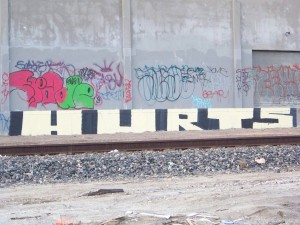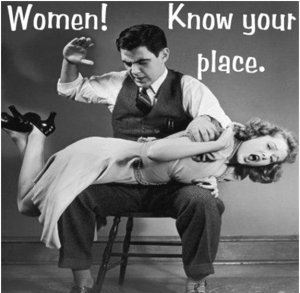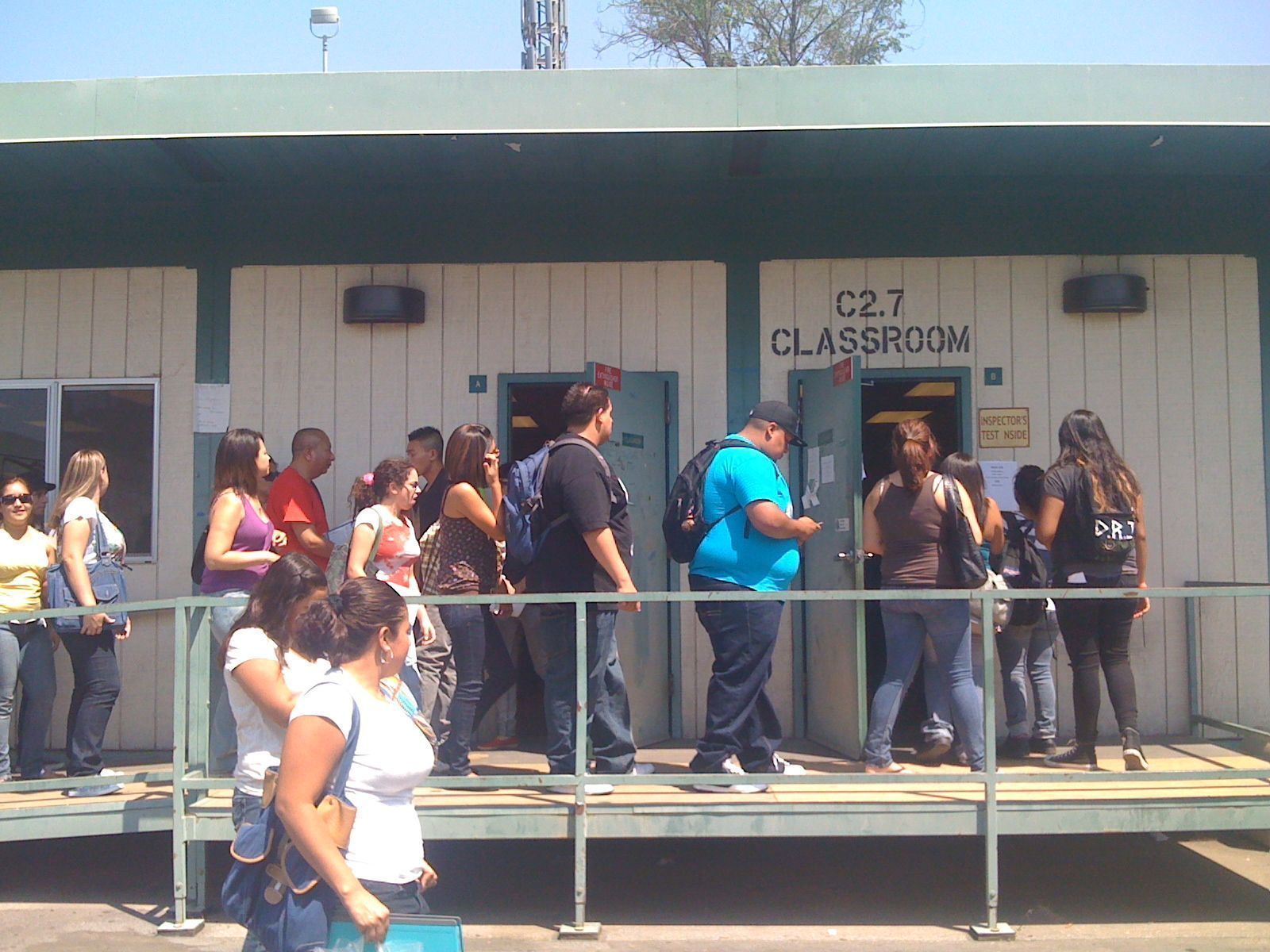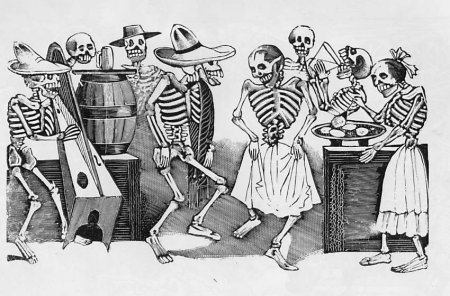NE corner Bonnie Beach Pl and Worth Street, East Los Angeles
Category Archives: Analysis
La Tree Hugger

Trucha! La Tree Hugger has back-up!
La Tree Hugger should be my chola name. I already have a fake chola name given to me by my friends but it doesn’t fit me as well as La Tree Hugger. By the way, until the night I got my fake chola name I didn’t know I had a special talent for anointing other people with well fitting chola names. I’m just as good as the Facebook quiz. You can take me up on it, invite me for a cocktail and I will christen you with a firme moniker in a barrio baptism.
But back to the point of this post, I love trees. And one of my main criticisms of some of my fellow Eastside neighbors is their need to cut down trees. Why all the tree hating vecinos?

Graphic from the excellent book:
The Tree Doctor: A Guide to Tree Care and Maintenance by Daniel Prendergast and Erin Prendergast
Silver Lake is not the Eastside and consumerism isn’t GREEN!!

Apparently the creepy consumer addict greenies over at your daily thread didn’t get the memo that the Eastside is EAST of the LA River.
Maybe they were meditating.
Browne Molyneux
H/T Franklin Avenue
Resistance Is Fertile: Hitlerian Lattes Discontinued – Life Now Served
Sexism in Living Electric Color
I’m not one for the personal anecdote story, but I can’t think of another woman blogger who uses their name and picture and makes critical comments. If I could I would definitely not use myself, but for the purpose of this post I’m going to have to.
The blogosphere are filled with many personalities.
I have a strong personality, but so does my partner Ran BusTard, but in general when it comes to getting reprimanded and banned I get it much quicker than him. No, I get it and no one says anything to him. He’s threatened to bodily harm people on blogs and no one has ever said anything to him. Not only that, they apologize for offending him. Politically we’re almost identical.
A guy on the blogosphere is allowed a blank check to be as obnoxious as he wants to be. It’s viewed as an asset, but women online have to be very, “lets get along,†especially in the nonpolitical blogosphere.
As a woman blogger you are limited to three areas of blogging:
1. Event Promotion
2. Product Promotion
3. Posting adorable pictures of yourself and talking about how you went to an event or used a product Continue reading
¡Bravo¡ LoLa ¡Bravo¡: The Eyes Have It
¡Sounds Like Burning: Play From Your Fucking Heart!
¡Sounds Like Burning is about psychos, angels and psychotic angels. Who else deserves mention?
Mister Bill Hicks introduces the series because he is… Bill Hicks. He condensed the first law of all the Arts: Play From Your Fucking Heart!
The performances to be aired here are rigodamnediculous. The biblical scholar Bon Scott once commanded: Let There Be Light. And There Was Light.
Bask in it.
Can one make the unknown known? Tune in and Trip out.
Bill Hicks “Burning Issues”
[audio:https://laeastside.com/wp-content/uploads/2009/09/flag.mp3]
Ron Shock remembers:
Other than the drunken orgies… we (Bill Hicks and I and the rest of the Comedy Outlaws) were pretty wild, we did a tremendous amount of drugs and we drank a tremendous amount of whiskey, and usually we did the drugs and the whiskey together. But there was one show we did… Hicks is on stage doing his impression of Elvis where he uses toilet paper instead of handkerchiefs and he would wipe his forehead with toilet paper and throw the toilet paper into the crowd. Jimmy Pineapple who was just drunk as a skunk comes running from side stage and tackles Bill, for no reason, just to do it, right in the middle of a show, in front of 900 people and tackles him and as Bill is laying on the ground without missing a beat, keeps on with his act, he’s still Elvis…
American Social Problems
I attended an intro to sociology course called “American Social Problems†during the second week of school at ELAC and left questioning my academic, sociocultural, and career intentions with a shed of liberal light from an episode of Michael Moore’s “Awful Truth.†Why do I really want to go to school? Am I making a bad investment with hopes of an unreasonably better return that I probably don’t deserve? If I succumb to the system, will I turn into a capitalist-driven bloodsucker whose bottom line is money?
I think America is inflicted with an at-large social cancer that is slowly (or quickly, depending on how one interprets time and space) detiriorating the human spirit and his/her pursuit of true happiness. This cancer is so detectable, it’s undetectable. I cringe when I see my neighbor’s toddler children eating corporate-made candies with their silver capped teeth. My heart aches when I see jobless, injured, disabled people loitering around Downtown LA, in front of LA County Hospital, at Hollebeck Park.
Will I change in a semester? Where is the hope in a deteriorating society?
More American social problems:
– Prescription drug addiction
– Overprescribing people
– Overdiagnosing people
– Inhumane conditions in American city/county jails and state prisons
– Close-minded Americanism
– American greed
– American obesity
– Corporate takeover on food
– Lazy, apathetic government employees
– American apathy
– Under-representation of day laborers who live month-to-month
– Corporate education
The educational pipe line
Who hid the Mexicans?
From the great blog Mex Files the question is asked “Where are the Mexican or Mexican American Chefs on the Food Channel Network cooking or explaining or visiting Mexican Restaurants and kitchens?” Always a sous-chef, never a chef
Paul Campos (Lawyers, Guns and Money) on U.S. television celebrity chef, Rick Bayless.
“… it struck me that in a country where the actual cooking in high-end restaurants is dominated by Latin Americans in general, and Mexicans and Mexican-Americans in particular, the “celebrity chef†doing the Mexican cooking against his French and Italian-American competitors was a very WASPy-seeming fellow. Nothing wrong with that of course — it’s not like you have to be a member of an ethnic group to be a great cook in that genre — but it also reminded me of the point Anthony Bourdain makes in Kitchen Confidential that almost none of the thousands of superbly skilled Mexican and Ecuadorian and Peruvian etc, cooks manning the lines ever seem to end up as head chefs or sous chefs at the fancy places they work, let alone with TV shows on the Food Network.”
Rick Bayless is a good Mexican cook and very respectful of the cuisine but he’s not a Mexican.
Separate but Equal Treatment via Rail Lines in L.A.
If you look at this photo you wonder what is this? And how did anyone think this was safe?
Why is the safety method on the Eastside going to be of the “pull yourselves up by the bootstraps†variety via cameras to blame personal drivers and old men in yellow vests reminding people to “be safe,†while the City of Los Angeles west of LaCienega get the “silver spoon†variety of safety with expensive barriers and elevated stations?
Why will there will be no testing out Darwinism theory of survival of the fittest on the Westside?
Only the neighborhoods with higher concentrations of poor people and brown and black people are tested with sink and swim theories.
The rail dips just one mile into the magic dividing line of LaCienega and the people on that side of LA who don’t walk or even use public transit as extensively as people on the Eastside get all of our tax dollars spent protecting them from being hit by a train that most of them won’t even take or even be near outside of driving by its protected barrier.
(This is an excerpt of a very long post entitled “Cameras Aren’t Going to Make Fewer People Die.”)
by Browne Molyneux
Bone-shaking volume
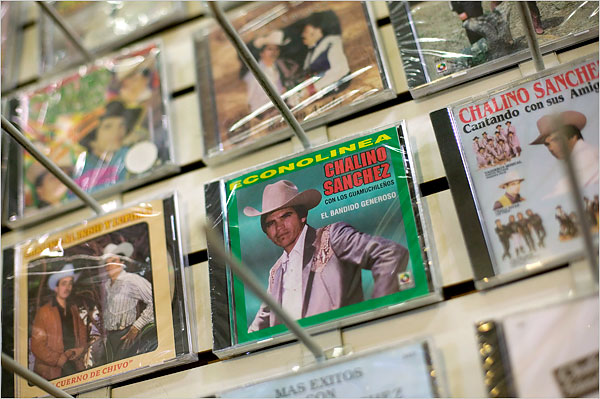
Photo: Eric Grigorian for The New York Times
This past weekend, the N.Y. Times‘ Travel section revisited Los Angeles, focusing on narcocorridos and venues that play an important part in its spread throughout Los Angeles. It went better this time than the last time they visited L.A.
Narcocorridos, and by extension, any form of Mexican music that is born and nourished in Los Angeles, are not covered much in the United States. Almost every time narcocorridos are mentioned in media, it’s tied with the current Mexican Drug war fiasco and spoken about negatively. I once sat in on a discussion with a well-known Mexican journalist at a university and she all but blamed the whole situation in Mexico & the Americas on narcocorridos. The whole time I sat there, I shook my head, unable to comprehend how someone could explicitly blame corridos for the “drug war” in México.
Coverage of narcocorridos in the U.S. is much different than in México. The United States is much less subjective than México in its coverage of narcocorridos. Mexican journalists have bought the Mexican government’s argument that narcocorridos are to blame for the drug trade and must be banned from radio play. American journalists have gone further into narcocorridos, documenting its rise and popularity among Mexicans in the United States and the constant airplay in radio. It’s a musical form that allows the children of Mexican immigrants to become immensely popular, though the singing is sometimes sub-par. Continue reading

